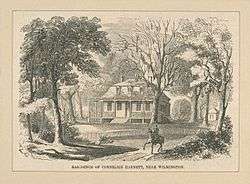Cornelius Harnett
Cornelius Harnett (April 10, 1723 – April 28, 1781) was an American merchant, farmer, and statesman from Wilmington, North Carolina. He was a leading American Revolutionary statesman in the Cape Fear region, and a delegate for North Carolina in the Continental Congress from 1777 to 1779. Cornelius Harnett is the namesake of Harnett County, North Carolina.[1][2]
Cornelius Harnett | |
|---|---|
 Poplar Grove, near Wilmington, North Carolina | |
| Born | April 10, 1723 |
| Died | April 18, 1781 (aged 58) |
| Occupation | politician |
| Spouse(s) | Mary Hold |
Personal life
Harnett was born on April 10, 1723 to Cornelius and Elizabeth Harnett in Chowan County, North Carolina. Soon after he was born, his parents moved to Wilmington. As an adult, he obtained a plantation in Wilmington. He became a leading merchant there, and was interested in farming, milling, and mercantile ventures. Harnett was an Episcopalian, but has also been identified as a deist.[3][4] Though he was an intelligent man, there is little known about his educational background. His intelligence served him well in his passion for politics.[5]
Harnett married Mary Holt where they lived on his second plantation, Poplar Grove, located in Scotts Hill, which is north of Wilmington.[6] During Harnett's political career, he maintained his relationship with his wife through letters. William Wilkerson, his associate, would deliver the letters.[7]
Harnett's death came about after being captured and "thrown across a horse like a sack of meal".[6] He was captured by the British upon their occupation of Wilmington in January 1781. His health steadily declined while imprisoned. He died April 28, 1781, shortly after being released on parole.
Political career
In 1750 Harnett became involved in public affairs when he was elected Wilmington town commissioner. He was appointed a justice of the peace for New Hanover County by Governor Gabriel Johnston. Harnett was elected to represent Wilmington in the Province of North Carolina House of Burgesses in 1754 and 1775.[8]
In 1765, Harnett became the chairman of the Sons of Liberty, and was a leader in the resistance to the Stamp Act. In 1775–1776, he served as the first president of the North Carolina Provincial Council, or Council of Safety, essentially the chief executive of the revolutionary state, although with limited powers. In 1776 he was excepted by Sir Henry Clinton from his proclamation of general amnesty. He was a member of the Continental Congress for 1777–1779.
Harnett was delegate from Wilmington to the 1st, 2nd, 3rd, and 4th North Carolina Provincial Congress. He was a delegate from Brunswick County and Vice President of the Fifth North Carolina Provincial Congress.[9][10][11]
References
- Gannett, Henry (1905). The Origin of Certain Place Names in the United States. Govt. Print. Off. p. 150.
- Lennon, Donald R. Lennon (1988). "Cornelius Harnett, Jr". NCPEDIA. Retrieved October 20, 2019.
- "Cornelius Harnet". Adherents.com. Archived from the original on June 24, 2017. Retrieved October 22, 2019.
- Powell, William Stevens, ed. (1988). Dictionary of North Carolina Biography: H–K. 3. p. 37.
- "The Education of Harnett | Cornelius Harnett". www.corneliusharnett.com. Retrieved 2015-10-02.
- Lennon, Donald R. (1988). "Harnett, Cornelius, Jr. | NCpedia". ncpedia.org. Retrieved 2015-10-02.
- "His Relationship with Mrs. Harnett | Cornelius Harnett". www.corneliusharnett.com. Retrieved 2015-10-02.
- Lewis, J.D. "Royal Colony of North Carolina, 27th House of Burgesses". Carolana.com. Retrieved October 24, 2019.
- Lewis, J.D. "2nd North Carolina Provincial Congress". The American Revolution in North Carolina. Retrieved April 16, 2019.
- Lewis, J.D. "3rd North Carolina Provincial Congress". The American Revolution in North Carolina. Retrieved April 16, 2019.
- Lossing, Benson John (1855). Our Countrymen: or, Brief Memoirs of Eminent Americans. Philadelphia: Lippincott, Grambo & Co. p. 83.
- Connor, Robert D. W. Cornelius Harnett;: An essay in North Carolina history, 1971, Books for Libraries Press (ISBN 0-8369-5647-8).
- Connor, Robert D. W. Revolutionary Leaders of North Carolina, reprinted 1971 from 1916 edition. (ISBN 0-87152-063-X) Chapter 3: pp. 49–78.
- United States Congress. "Cornelius Harnett (id: H000218)". Biographical Directory of the United States Congress.
External links
- Excerpt from "Dictionary of North Carolina Biography" (ISBN 0-8078-1918-2)
- Cornelius Harnett Letters, #311-z at the Southern Historical Collection, Wilson Library, University of North Carolina at Chapel Hill
| Government offices | ||
|---|---|---|
| New creation | President of the North Carolina Provincial Congress 1776 |
Succeeded by Samuel Ashe |